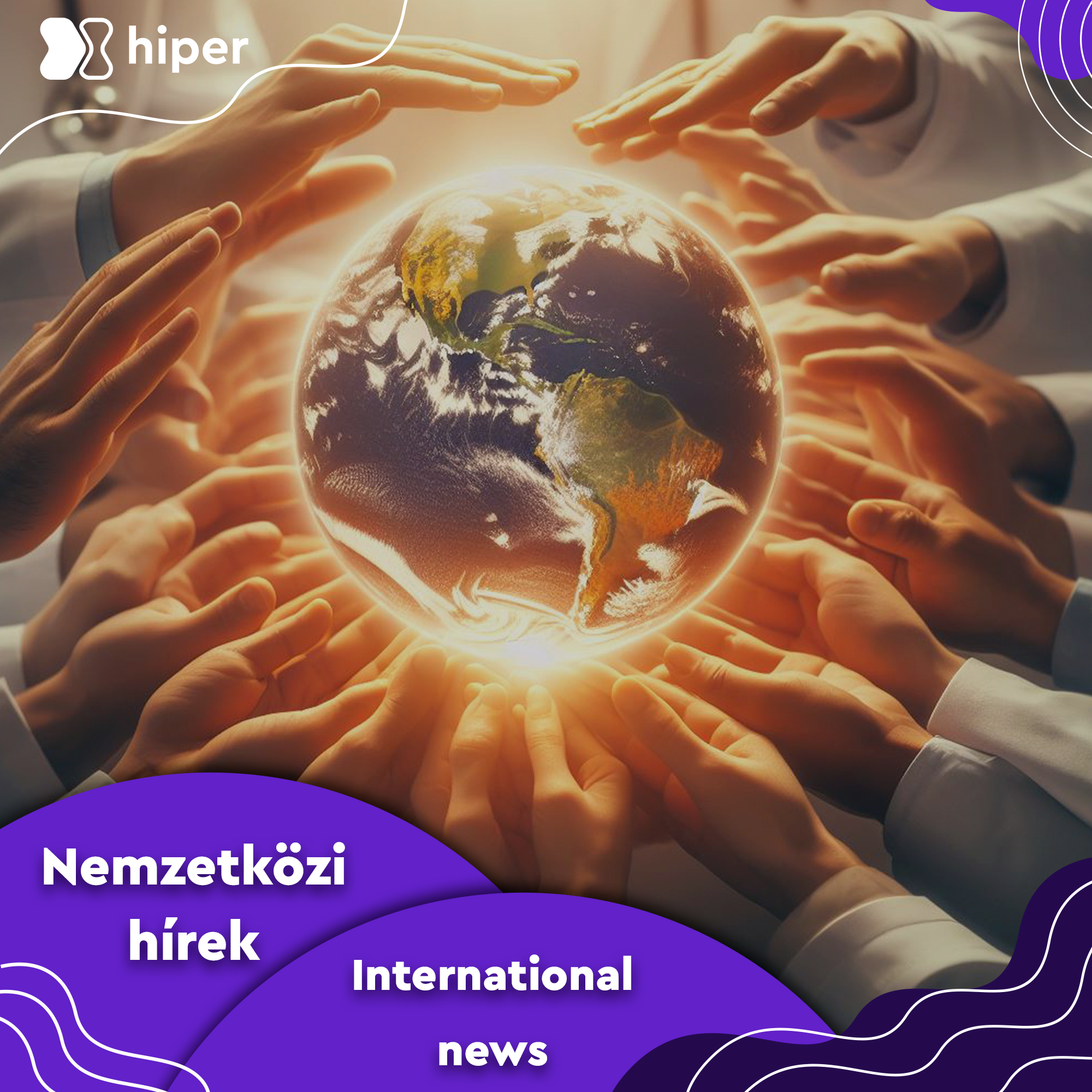International news 2024/11
Nemzetközi hírek, 27 June 2024
The EU passes the AI Act and its implications for digital medicine are unclear/ Czech healthcare workers secure major pay raise, concerns remain/ 14 Emerging Wearable Health Technologies Transforming Remote Care/ Empowering Nurses Through Education

The EU passes the AI Act and its implications for digital medicine are unclear
On March 13, 2024, the EU Parliament passed the AI Act, which will soon become law, imposing significant requirements on developers and deployers of AI-enabled digital health tools (DHTs). The Act will be enforced in stages over the next 36 months and applies to high-risk AI systems, general-purpose AI, and excludes AI solely for scientific research. Its goal is to promote human-centric, trustworthy AI while protecting health and fundamental rights, and fostering innovation. However, many details on its implementation and intersection with existing medical regulations remain unclear. Future clarifications will come from standards, guidelines, and member state laws. The AI Act introduces 'AI regulatory sandboxes' for testing innovative AI systems under regulatory supervision. Successful implementation will require flexible and intelligent regulatory governance.
Czech healthcare workers secure major pay raise, concerns remain
The Czech Health Ministry has proposed a draft law to reform healthcare worker and doctor salaries, set to take effect in January 2025. The new law aims to ensure hospital doctors earn 1.5 to 3 times the average national wage. This follows commitments made in December 2023 in response to doctors’ protests. The reform includes annual salary increases and additional pay for years of experience. However, the Czech Medical Chamber and healthcare unions criticize the slow progress in implementing promised reforms, particularly concerning medical education and working conditions. Despite assurances from the Health Ministry, further protests are possible if demands are not met.
14 Emerging Wearable Health Technologies Transforming Remote Care
Wearable health technologies are revolutionizing remote healthcare by offering continuous monitoring and real-time data, enhancing patient outcomes. Key innovations include:
- Continuous Vital Sign Collection: Wearable devices provide real-time health data, enabling timely intervention and personalized care.
- Microfluidic Patches: These patches offer real-time biomarker analysis, improving diagnostic accuracy and patient engagement.
- Wearable ECGs: Devices like smartwatches and patches allow remote cardiac monitoring, aiding in early detection of stroke risks.
- Continuous Glucose Monitoring (CGM): CGMs provide real-time blood sugar levels, improving diabetes management.
- AI in Patient Monitoring: AI processes vast biometric data quickly, enabling preventive care and reducing healthcare costs.
- Integration with EHRs: Wearables integrated with electronic health records provide comprehensive patient health insights.
- AI-Powered Robotic Prostheses: These prostheses adapt and improve performance through AI, enhancing daily life for users.
- Sensor-Embedded Smart Fabrics: These fabrics continuously monitor vital signs, reducing the need for clinical visits.
Empowering Nurses Through Education
Nurses, constituting 60% of the healthcare workforce, play a critical role in patient care across various settings. Continuing nurse education is vital for keeping nurses updated with the latest developments, enhancing their skills, and improving patient outcomes. Participating in interprofessional education programs alongside physicians fosters collaboration, empowering nurses in patient advocacy and personalized care planning. Amy Bernard of Medscape Education highlights that such education helps nurses communicate better and improve care quality. Additionally, team-based learning reduces burnout, enhances job satisfaction, and promotes a culture of mutual respect. Medscape supports ongoing professional development with specialized courses for nurses, emphasizing the importance of continuous education in delivering high-quality healthcare.
HCA Healthcare CNIO shares how nursing informatics improves patient care
Nursing informatics is revolutionizing healthcare by integrating people, processes, and technology to create evidence-based IT systems that enhance nursing care and patient satisfaction. At HCA Healthcare, with over 99,000 nurses, nursing informatics is leveraged to improve care delivery through data-driven insights from patient encounters.
Key initiatives include providing clinicians with over 100,000 iPhones for improved communication and documentation, implementing virtual nursing to reduce administrative burdens, and exploring ambient voice technology for efficient documentation. These advancements enable quicker communication, direct patient alerts, and streamlined documentation processes.
HCA Healthcare's nursing informatics agenda aligns with its broader technology strategy, ensuring collaboration between nurse informaticists, IT, and Care Transformation teams. Future innovations in nursing informatics will focus on real-time patient data integration, expanded virtual care, enhanced patient monitoring, and data analytics for informed decision-making, ultimately aiming to reduce administrative tasks and support better patient outcomes.
Balancing Books and Scrubs: How Online Nursing Programs Are Changing Education for Working Nurses
In today’s fast-paced healthcare environment, the demand for skilled nurses is rising, prompting the need for flexible educational options. Online nursing programs, like the FNP program in Ohio, offer nurses the ability to advance their education while balancing their professional responsibilities. These programs provide flexibility in scheduling, allowing nurses to complete coursework at their convenience, whether during off-hours or between shifts. Despite initial skepticism, online programs ensure hands-on learning through local clinical placements and adhere to rigorous accreditation standards, contributing to improved patient care outcomes. As technology continues to evolve, these programs are poised to further enhance educational experiences through interactive tools, preparing nurses for the complexities of modern healthcare.
Effects of midwifery and nursing students' readiness about medical Artificial intelligence on Artificial intelligence anxiety
Background
Artificial intelligence (AI) technologies are increasingly pivotal across various sectors, including healthcare. It is crucial for healthcare professionals, including midwife and nurse candidates, to be prepared for AI integration to mitigate potential training challenges.
Aim
This study aimed to explore how AI readiness influences AI anxiety among midwifery and nursing students. It also assessed the impact of AI-related factors (AI knowledge, daily life integration, perceived occupational threat, and trust in AI) on students' AI readiness and anxiety levels.
Methods
Conducted as a quantitative relational survey, the study involved 480 students—240 nursing and 240 midwifery students.
Results
There was no significant difference in medical AI readiness (p=0.082) and AI anxiety (p=0.486) scores between midwifery and nursing students. The structural equation model demonstrated a good fit, indicating AI knowledge and daily life AI use predict AI readiness, while daily life AI use, perceived occupational threat, and trust in AI predict AI anxiety.
Conclusion
Both midwifery and nursing students showed moderate levels of AI anxiety and readiness. Notably, AI readiness was found to influence AI anxiety levels among students, highlighting the importance of preparing future healthcare professionals for AI integration.
Commercialised nursing education fuels migration of nurses to the UK, strains Indian healthcare
The trend of Indian nurses migrating to the UK has been highlighted in a recent study funded by the Economic and Social Research Council (UK), published in the British Medical Journal. This migration trend is significantly detrimental to India's healthcare system, exacerbating the existing brain drain. According to the Federation of Indian Chambers of Commerce and Industry (FICCI) and Ernst & Young (EY), India aims to increase its nursing workforce to 12.5 to 15 million by 2047 to align with global averages. However, ongoing nurse migration undermines these goals, contributing to a severe shortage of nurses in India, where the nurse-to-population ratio falls below WHO recommendations. Twinkle Caroline Vinita from KITES Senior Care highlighted challenges such as low remuneration, long hours, and limited career growth opportunities exacerbating the issue.
Healthcare Errors: It Is Time to Tackle Them, Not Tolerate Them
Following revelations that medical errors rank as a leading cause of death in the US, the healthcare sector's response has been mixed, often lacking the urgency seen in other safety-critical industries like aviation. In contrast, the airline industry swiftly implements stringent safety protocols after incidents to enhance passenger safety and operational standards. The #SAFE50 initiative proposes a significant shift in nursing education by advocating for integrating virtual simulations into 50% of the curriculum. This approach is designed to bolster nurses' clinical judgment skills and mitigate the high incidence of errors noted in novice nurses, who are frequently involved in medication errors. By preparing nursing students with realistic, hands-on virtual simulations, the initiative aims to address the challenges of nursing turnover and workplace stress while enhancing patient safety across healthcare settings. Joining the #SAFE50 initiative is crucial for fostering safer healthcare environments and ensuring that nursing professionals are well-equipped to handle the complexities of modern healthcare delivery.
Social media deterring new nurses from entering the field
Social media, particularly platforms like TikTok, significantly influences Gen Z's perceptions of nursing careers, according to a study by ShiftKey. Among 1,000 respondents aged 18-26, social media emerged as a primary source of information influencing career decisions, with 66% using it for research. Unfortunately, a ShiftKey analysis found that 64% of nursing-related TikTok posts were negative, potentially deterring potential nurses with skewed depictions. Family influence also plays a pivotal role, with positive family experiences influencing career decisions. The study underscores nursing's branding challenge and suggests more positive social media content could attract more individuals to the profession. Additionally, issues like mental health considerations, work flexibility, and compensation remain critical concerns among nurses, reflecting ongoing challenges in the nursing workforce.
‘The decline in mature student numbers is a critical blow to the healthcare sector’
Mature student nurses face significant challenges but remain dedicated to pursuing their nursing careers, recognizing their crucial role in healthcare. However, recent data from UCAS reveals an alarming 11% drop in applications from mature students for nursing degrees in England, posing serious concerns for the nursing workforce's future stability and diversity. This decline threatens to exacerbate the NHS's existing 10.3% vacancy rate and hinders efforts to achieve a diverse healthcare workforce. Immediate intervention is crucial, with calls for flexible nursing programs, blended learning options, and local training placements to attract and support mature students effectively. These measures not only enhance educational inclusivity but also bolster healthcare quality by ensuring a competent and diverse nursing workforce capable of meeting patient needs.
How to Turn Healthcare Into a Cool Career
Healthcare organizations grappling with workforce shortages are urged to prioritize culture and innovation over salary competitiveness, according to panelists at the HealthIMPACT Forum. Leaders from Aspirus Health and Northeast Georgia Health System discussed strategies to retain and attract talent amidst fierce competition from tech giants like Microsoft and Amazon. They emphasized the need for healthcare to offer attractive perks such as work-from-home options, childcare support, and improved workflows to enhance work-life balance. Innovations like virtual care and digital health tools are also being leveraged to reduce burnout and enable clinicians to focus more on patient care. Collaboration with educational institutions is crucial to promote healthcare careers from high school to college, showcasing industry culture and job opportunities effectively. The panel stressed the importance of adapting to the expectations of the emerging workforce and highlighting healthcare as a rewarding career path beyond financial incentives.



